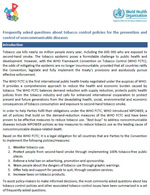
Frequently asked questions about tobacco control policies for the prevention and control of noncommunicable diseases: Introduction and sources
© World Health Organization 2015.
Tobacco use kills nearly six million people every year, including the 600 000 who are exposed to second‐hand smoke. The tobacco epidemic poses a formidable challenge to public health and development. However, with the WHO Framework Convention on Tobacco Control (WHO FCTC), the odds of mitigating the epidemic are no longer insurmountable, provided that all countries ratify the Convention, legislate and fully implement the treaty’s provisions and assiduously pursue effective enforcement.
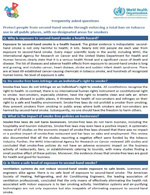
Frequently asked questions: Protect people from second‐hand smoke through enforcing a total ban on tobacco use in all public places, with no designated areas for smokers
© World Health Organization 2015.
The global evidence is indisputable: second‐ hand smoke is not only harmful to health; it kills. Nearly 600 000 people die each year from exposure to second‐hand smoke. Every major scientific body in the world, including WHO, the International Agency for Research on Cancer and the United States Department for Health and Human Services clearly state that it is a serious health threat and a significant cause of death and disease.
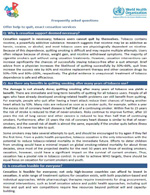
Frequently asked questions: Offer help to quit, enact cessation services
© World Health Organization 2015.
Cessation support is necessary; tobacco users cannot quit by themselves. Tobacco contains nicotine, a powerfully addictive substance. Research suggests that nicotine may be as addictive as heroin, cocaine, or alcohol, and most tobacco users are physiologically dependent on nicotine. Because of this dependence, quitting smoking is difficult and may require multiple attempts. Users often relapse because of stress, weight gain, and nicotine withdrawal symptoms. The majority of cigarette smokers quit without using cessation treatments.
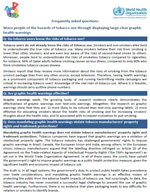
Frequently asked questions: Warn people of the hazards of tobacco use through displaying large clear graphic health warnings
© World Health Organization 2015.
Tobacco users do not already know the risks of tobacco use. Smokers and non‐smokers alike tend to underestimate the true risks of tobacco use. Many smokers believe their risk from smoking is lower than other smokers, and are even less aware of the risks of second‐hand smoke to others. Moreover, people tend to underestimate the risks of smokeless tobacco compared to cigarettes; for instance, 96% of Qatar adults believe smoking causes serious illness, compared to only 80% who think smokeless tobacco causes disease.
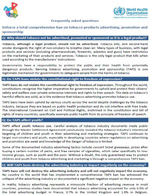
Frequently asked questions: Enforce a total comprehensive ban on tobacco products advertising, promotion and sponsorship
© World Health Organization 2015.
Tobacco, although a legal product, should not be advertised. Tobacco kills, and second‐hand smoke disregards the right of non‐smokers to breathe clean air. Many types of business, with legal products and services (including pharmaceuticals, fireworks, asbestos and guns) have restrictions on the marketing of their products and services. Governments have a responsibility to protect the public and their health from potentially dangerous products. Banning tobacco advertising, promotion and sponsorship (TAPS) is one legitimate mechanism for governments to safeguard people from the harms of tobacco.
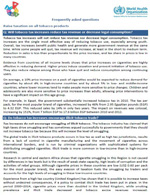
Frequently asked questions: Raise taxation on all tobacco products
© World Health Organization 2015.
Tobacco tax increases will not reduce tax revenue nor decrease legal consumption. Tobacco tax increases are the single most effective way of reducing tobacco use, especially among youth. Overall, tax increases benefit public health and generate more government revenue at the same time. While some people will quit, tax revenue will increase, at least in the short to medium term. Reduction in sales is less than proportionate to the price increase, and tax share in prices is low in many countries.
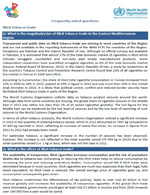
Frequently asked questions: Illicit tobacco trade
© World Health Organization 2015.
Transparent and public data on illicit tobacco trade are missing in most countries of the Region and are not available in the reporting instruments of the WHO FCTC for countries of the Region. Exceptions are Pakistan and the Islamic Republic of Iran. Although no official surveys are available in Pakistan, it is estimated that almost 17% of the total domestic market of cigarettes is illicit which includes smuggled, counterfeit and non‐duty paid locally manufactured products.




